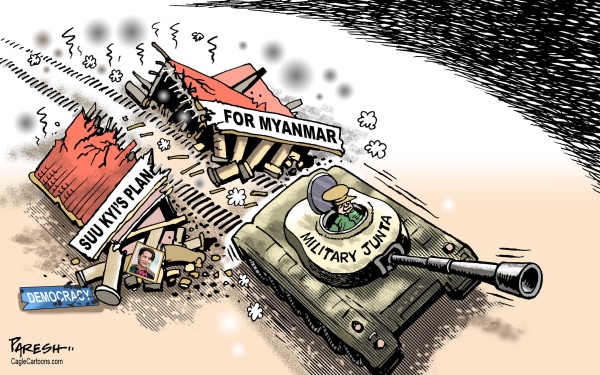Humanitarian Resistance Work in Myanmar
A Portrait of Hilary, a Humanitarian Resistance Heroine of the Civil War in Burma

In early 2021, Myanmar’s democratically elected government, the National League for Democracy, led by Nobel Peace Prize–winner Aung San Suu Kyi, was overthrown in a military coup d’état. A civil war ensued, with Myanmar’s military being accused of war crimes, including murder, sexual violence, torture, and the targeting of civilians.
To meet the desperate needs of people in or displaced from villages attacked by the military, humanitarian resistance movements sprung up around the country. This is the story of one member of the humanitarian resistance movement.
Hilary is a woman in her early forties who previously worked for the National League for Democracy. Unable to continue that work, she founded an organization in Mandalay that typifies the resistance movement. Using small donations of funds and supplies from organizations that range from the United Nations to Save the Children to donors around the world, Hilary’s organization focuses on discreetly shipping goods to meet the desperate needs of people in parts of Myanmar most severely affected by the country’s civil war.
Since her work is in direct defiance of the military government, Hilary must remain hidden. She remains indoors except when moving from house to house to avoid arrest. She uses her contacts with the National Unity Government and ethnic organizations to learn about the most critical needs in the field. She then must identify a source for the necessary goods or purchase them with money that has been donated.
Sending medical supplies to hospitals and clinics in conflict areas must also be done discreetly. Her teammates must also work “below the radar.” They pick up goods, transport them to a secret location, and disguise the shipment’s contents as foodstuff or other non-essential items. To avoid waste, the inner packaging hiding the medication may include plastic that can be used for shelter or groundcover, old newspapers that can be used for children to learn how to read, or both. To avoid detection by soldiers at checkpoints, they may add female clothing (which the soldiers will not touch out of fear of losing their virility) or fermented fish paste (which the soldiers will avoid because of its unpleasant odor).
Transportation is the next challenge. Buses are used as far as their routes go. The shipment is then transferred to motorbikes to reach the hidden clinics that are often the destination. The team usually includes gifts of food for those transporting the cargo to ensure the goods arrive safely.
A recent example illustrates this process. Women in much of the country no longer have access to contraceptives, but the need is more significant than ever due to the lack of safe maternity facilities. Aware of this demand, Hilary heard from the United Nations Population Fund that condoms and long-acting injectable contraceptives were available from an International Nongovernmental Organization (INGO) that remained active in the country. However, the INGO did not want to risk shipping aid to people who were being targeted by the military. The INGO, therefore, contacted Hilary and asked how much they could give her. The needs in the field were virtually unlimited.
Unfortunately, a few days ago, a bus driver was discovered transferring a shipment to local couriers. All were taken to a soccer field and beaten in front of the spectators.
Hilary’s response: Change her shipment routes and continue her work.



